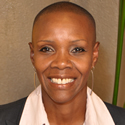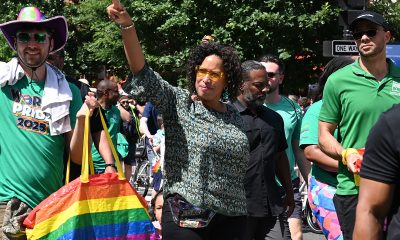Living
Queery: June Crenshaw
20 questions for the Whitman-Walker Clinic board chair

Coming out wasn’t easy for June Crenshaw. She was out to her friends and some family and had a girlfriend in high school in her native Tulsa, Okla., but being gay in the Midwest at the time wasn’t cool she says.
“It was not a safe and welcoming environment by any stretch of the imagination,” the 48-year-old Shaw resident says. “It was extremely challenging and I lost a lot of family who would no longer associate with me. I also lost friends. It wasn’t easy at all.”
Despite the hostile reception, Crenshaw stayed in Oklahoma for college where she studied business and computer science. But a mid-’80s economic slump pushed her to look elsewhere for jobs after college and it turned out to be a blessing. She came to Washington for work and has stayed ever since. But the hostile reception she got from coming out stung to the point that she lived a straight life for a few years, got married to a man and had a son.
“He knew my preference was women but we got married anyway,” Crenshaw says. “It really was pressure from the Midwest and wanting to fit in and really thinking we could do things differently. Immediately it didn’t work.” Life was easier in Washington and Crenshaw was in a long-term relationship with a woman for 12 years. She discovered Whitman-Walker quickly upon her arrival and got involved. She’s in her second term as board chair and previously was on the community advisory board of the Lesbian Services Program and steering committee for a black lesbian support group.
“It was just one of the first places that provided a very positive women’s safe space to come and talk to like-minded women,” she says. “I got involved immediately.” By day Crenshaw does system upgrades and installation for Coventry Health Care in Bethesda, Md. She’s single and enjoys working out, shopping, dancing and socializing with friends in her spare time.
How long have you been out and who was the hardest person to tell?
I have been out for a very long time and I come out every day — it is a lifelong process. The hardest person to talk to about being a lesbian was my son who was 7 at the time. It impacted his life the most and I was careful about protecting him but also living authentically and openly as a lesbian. It is impossible to raise a child to be honest and proud of whom they are if you can’t do the same thing.
Who’s your gay hero?
This list could go on and on starting with all my colleagues on the board of Whitman-Walker Clinic and Rainbow Response Coalition but specifically strong black local lesbians such as Sheila Alexander-Reid, Carlene Cheatham, Darlene Nipper, Donna Payne and Tamara Dunlap-Elkins and, of course, the late Charlotte Smallwood and Wanda Alston. I also find heroes in up-and-coming leaders such as Amy Loudermilk and LGBTQ allies such as Don Blanchon. My heroes are those people that show up and do the hard work every day no matter the challenges or obstacles and those types of people are all around us.
What’s Washington’s best nightspot, past or present?
I love to dance and Tracks was a great past place for that but my current favorite is Lace. It provides the perfect mix of a great meal, a relaxing place to have a conversation, great dance music and of course beautiful women.
What’s your dream gay wedding?
Being barefoot on the beach at sunset committing my life and my love to the woman of my dreams. And then a great party full of laughter to celebrate afterwards surrounded by all the important people in my life.
What non-gay issue are you most passionate about?
That’s a tricky question because all issues are both gay and non-gay. For example, equality is not a gay issue — it’s a human rights issues. The right to marry, fair and equitable treatment in the workplace, housing, access to health care and education, are human rights issues and are about fairness. …We are a part of the larger community and are impacted by all these things but we are also disproportionally affected by some issues. That said, I am passionate about the lack of service, outreach, education and support to LGBTQ survivors and victims of intimate partner violence.
What historical outcome would you change?
I would change the death of Martin Luther King. The civil rights movement continued without him but we might have made more progress.
What’s been the most memorable pop culture moment of your lifetime?
The new popularity with reality television. I can’t seem to look away from the train wreck.
On what do you insist?
Being out in all aspects of my life.
What was your last Facebook post or Tweet?
Not much. I am pretty passive/aggressive around Facebook. I use it to stay up to date with friends and family without actually having to talk to anybody.
If your life were a book, what would the title be?
“You Are Never Too Old to Grow Up”
If science discovered a way to change sexual orientation, what would you do?
Recommend it to all my straight girlfriends who constantly tell me they wish they were lesbian.
What do you believe in beyond the physical world?
It’s complicated.
What’s your advice for LGBT movement leaders?
I would like to see the LGBTQ movement leaders create trusted, supportive networks to mentor our smart, young talented future leaders and to provide the crucial leadership to them that is needed. I think we should partner more around issues to increase our opportunity for success. We have all these silo organizations that could use our collective energy and reduce redundancy and duplication of effort. We need to look for ways to increase civic and community engagement and improve diversity among our leaders.
What would you walk across hot coals for?
A pair of Lucchese cowboy boots and of course, my family and close friends.
What gay stereotype annoys you most?
“Lesbian second dates involve a U-Haul.”
What’s your favorite gay movie?
“The Color Purple” — it had a gay scene so it qualifies.
What’s the most overrated social custom?
To arrive late for an event or activity, not just occasionally but as a matter of practice.
What trophy or prize do you most covet?
Unconditional love
What do you wish you’d known at 18?
That life is so precious, we need to live and be in the moment. And where we are today is not where we will be forever.
Why Washington?
I moved to Washington on Sept. 14, 1985 from Tulsa, Okla. It was a culture shock for me. When I flew into National Airport the first thing I noticed was all the beautiful trees and the second thing I noticed was the diversity. I knew it was the place for me.
Advice
My federal worker husband is depressed and I don’t know how to help
I feel like he’s dragging me into his hopelessness

Dear Michael,
My husband is a federal worker. Many of his colleagues took “the fork” or have been fired. So work has been overwhelming. He usually works late. The morale in his office is terrible. His paycheck disappeared with the shutdown although due to the specifics of his job, he still had to go in. He’s gotten increasingly depressed, irritable, and short-tempered.
I met Jason 20 years ago when we were young, and one of the things that made me fall in love with him was his idealism. He came to Washington because he wanted to contribute to the well-being of our country.
When I look at him now, it’s like he’s been through the wringer. He’s lost his idealism, feels unappreciated by our country, and is becoming bitter.
He never wants to go out with friends. Either he doesn’t want to hear them complain about the same sorts of things he’s experiencing, or he doesn’t want to have to interact with people who are doing just fine, job-wise.
He also doesn’t feel like going out, just the two of us. So we’re home a lot. But we’re not spending time together when we’re at home. He’s surfing the internet, doom-scrolling, or playing video games.
I can’t get him to talk to me; he says, “I don’t want to talk about anything, it just makes me feel worse.” I can’t get him to do anything that might help him feel better. He doesn’t want to cook dinner with me, he doesn’t want to eat any of his favorite foods that I make for him, he won’t go for a walk with our dog (exercise is supposed to help mood, right?).
I’m really worried about him. Clearly, he’s depressed, and nothing I am trying is helping him to feel better.
But in addition, I am starting to get annoyed. How much more can I try to do things for him that he doesn’t respond to and doesn’t appreciate?
I’ve been OK through this long slog, so far, but now I feel like I am being sucked into his depression and hopelessness. I’m starting to feel like giving up. I’m lonely and I miss my husband and I am despairing that he’s ever really going to come back.
In short, now I hate my life, too.
I’m not going anywhere but I am worried that my main feeling toward him is starting to be apathy. Is there something I can do to help him that I haven’t thought of?
Michael replies:
I’m sorry, this is such a rough time.
It’s understandable that when someone you love is suffering and feeling miserable, you might at times get fed up and feel like pulling away.
There’s a great saying by an ancient Jewish sage, Rabbi Tarfon: While you can’t fix the whole world, that doesn’t mean you should give up and do nothing to help.
I thought of that saying as I read your letter, because while you can’t get Jason to change his mood or take action on his own behalf, you may have some ability to help him.
Similarly, while you can’t have a fantastic time in life when your husband is in a miserable place, you can take care of yourself and likely have a better life than you are having at present.
For starters, I encourage you to keep reminding yourself that this is without doubt one of the hardest periods of your husband’s life. So it’s a very good idea to have an open heart and a lot of compassion for Jason, as much of the time as you can. This won’t be easy. Strive to keep in mind that getting angry at Jason or frustrated with him won’t help.
Don’t try to insist that Jason do anything. Often, when we push someone to do something that they don’t want to do, this just results in their digging in more. People generally don’t like to be nagged.
Of course you can ask Jason if he’d like to join you for a walk, or an outing, but tread carefully. You can advocate for what you’d like, but Jason gets to decide what he wants to do.
You can certainly ask Jason what he would like from you, especially when he’s complaining. I love the “3 H’s” concept: Would he like you to hear (simply listen)? Would he like help (advice on what to do)? Or would he just like a hug?
The best message you can send to Jason, by your presence and by an ongoing loving stance, is “I am here. You’re not alone.” Even when he wants to stay in the basement playing video games. You’re not criticizing him and you’re not judging him. Maybe you’re baking some cookies you both like and leaving him a plateful to eat if and when he wants to. (Be sure to treat yourself to some, as well.)
In terms of bigger interventions, you can suggest that Jason meet with a therapist, or meet with his physician to discuss the possibility of an antidepressant to help him through this awful period. For example, you might have a sincere conversation where you say something like this:
“I’m worried about you. I really want to encourage you to get some help. My love for you can only go so far, and while I’m not going anywhere, I’d like you to take seriously how miserable you are. I’m here to encourage you that maybe you could feel better, even though your circumstances are terrible and you feel disillusioned.”
Again, trying to convince or force Jason to take action will likely go nowhere useful.
Now let’s focus on you. Living with a depressed spouse can be a miserable, soul-crushing experience. As you described, you’re watching the person you love suffer, and you’re pretty much losing your partner in so many of the things that make life enjoyable.
Part of getting through this is to acknowledge that there is a limit to what you can do for Jason. And part of it is to strengthen your commitment to self-care. Taking care of yourself may keep you from going too far into misery or resentment. He doesn’t want to get together with a friend? Consider going anyway, and do your best to have at least a good time. Same thing with a dog walk, a good meal, or sitting down to watch a movie you’d like to see. You might also consider meeting with a therapist for ongoing support and strategizing.
While this period of your life is gruelingly difficult, try to remember that it likely will come to an end, that there will likely be good times ahead for you and for Jason, and that in the meantime, doing your best to find ways to take care of yourself while also being a supportive and loving spouse will help you to survive.
Michael Radkowsky, Psy.D. is a licensed psychologist who works with couples and individuals in D.C. He can be found online at michaelradkowsky.com. All identifying information has been changed for reasons of confidentiality. Have a question? Send it to [email protected].
Real Estate
Tips for LGBTQ buyers, sellers during holidays
A powerful and overlooked window for real estate transactions

The holiday season is a magical time, filled with celebration, travel, connection, and reflection. It also happens to be a powerful — and often overlooked — window for both buying and selling real estate. For members of the LGBTQ+ community, shopping for a new home or preparing to list a property during the holidays comes with opportunities, challenges, and important considerations that deserve thoughtful attention.
Whether you’re preparing to make a move as a same-sex couple, searching for safe and affirming neighborhoods, or hoping to secure the best possible price for your home sale before the new year, the holidays can offer unique advantages. With an inclusive approach, LGBTQ+ friendly resources, and the right professional guidance, this season can be a strategic and rewarding time to take your next real estate step.
Below are actionable tips, insights, and resources specifically tailored to LGBTQ+ home buyers and sellers navigating the holiday season.
Why the Holidays Can Be the Right Time
Lower Competition & Motivated Sellers
Because so many people put their real estate plans on pause during November and December, LGBTQ+ home buyers may see lower competition, fewer bidding wars, and sellers who are eager to close before January. This can bring real advantages for first-time gay home buyers or same-sex couples seeking more favorable negotiating terms.
Buyers Are More Serious
If you’re selling your home as an LGBTQ+ individual, remember: holiday buyers tend to be more intentional, financially prepared, and timeline-driven. This can make the sale process smoother.
Holiday Appeal Helps Homes Show Better
Warm lighting, seasonal décor, and neighborhood festivities can enhance curb appeal and emotional impact — which can be especially valuable when selling your home.
Tip #1: Choose LGBTQ-Friendly Representation
Above all else: work with a professional who understands the LGBTQ+ community and the unique concerns LGBTQ+ clients have.
This means choosing:
- a gay realtor
- a lesbian realtor
- an LGBTQ+ friendly real estate agent
Agents who are part of, or deeply familiar with, the LGBTQ+ community can make a tremendous difference in safety, comfort, and confidence throughout the transaction.
For more than 30 years, GayRealEstate.com has been the trusted leader in LGBTQ+ real estate, providing LGBTQ+ home buyers and sellers access to:
- verified LGBTQ+ real estate agents
- same-sex couple home buying experts
- LGBTQ+ friendly realtors near you
- agents experienced in discrimination-related protections
- LGBTQ+ relocation specialists
Whether you’re buying or selling, this starts you on the right path.
Tip #2: Focus on LGBTQ-Friendly Neighborhoods
If you’re buying a home during the holidays, make researching neighborhoods a top priority.
Look for areas known for:
- Inclusion & diversity
- Active local LGBTQ+ groups
- Gay-friendly businesses
- Visible LGBTQ+ community presence
- Supportive schools & services
- Pride events & alliances
Searching online helps — but talking with an LGBTQ+ friendly realtor who knows these neighborhoods firsthand is invaluable.
Also search:
- LGBTQ+ crime statistics
- local anti-discrimination policies
- protections against housing discrimination
- hate crime data
- political climate
- HOA regulations
Your home should feel safe year-round, not just festive in December.
Tip #3: Know Your Legal Protections
Housing discrimination still exists — and LGBTQ+ home buyers and sellers must remain vigilant.
While federal protections exist through the Fair Housing Act (as interpreted to include sexual orientation and gender identity), not all states provide equal protection.
Know your rights around:
- Mortgage discrimination
- Rental screening discrimination
- Sellers refusing offers from LGBTQ+ buyers
- HOA discrimination
- Harassment after move-in
Your agent should be able to assist — but GayRealEstate.com also offers educational guidance and resources for navigating LGBTQ+ legal protections in real estate
Tip #4: Navigate the Emotional Side
For LGBTQ+ buyers and sellers, the holidays can stir up complex feelings:
- family dynamics
- financial pressure
- expectations around marriage or partnership
- relocation stress
- memories tied to a home
Be patient with yourself.
Buying or selling a home is life-changing — honor the emotional journey as much as the financial one.
Tip #5: Take Advantage of Holiday Cost Savings
Buying?
- Lower interest rates may appear around December
- Contractors often discount home inspections & repairs this time of year
- Movers run holiday promotions
Selling?
- Minor seasonal upgrades help tremendously:
- warm lighting
- new evergreen planters
- festive front door accents
- Be careful not to over-decorate — buyers need to see the space clearly
And yes — holiday cookies help.
Tip #6: If You’re Relocating — Plan Ahead
Many LGBTQ+ buyers relocate during the holidays to:
- be closer to family
- move in with a partner
- begin a new job in the new year
If you’re relocating as an LGBTQ+ couple or family:
- research local LGBTQ+ resources
- connect with local LGBTQ+ organizations
- ask your gay real estate agent about local LGBTQ+ clubs, groups, and services
- evaluate long-term safety for LGBTQ+ families
Plan early — December moves get booked fast.
Tip #7: Use Trusted LGBTQ Real Estate Resources
The most important resource of all:
GayRealEstate.com — the #1 dedicated LGBTQ+ real estate resource for over 30 years.
On GayRealEstate.com, you can find:
- LGBTQ+ friendly real estate agents nationwide
- Verified gay and lesbian Realtors
- LGBTQ+ real estate market information
- Same-sex couple home buying guidance
- LGBTQ+ real estate services
- Gay and lesbian friendly neighborhoods
- Relocation tools
- LGBTQ+ home buyer & seller education
No other site offers this level of specialization, expertise, or community connection.
The holidays are more than just a season of celebration — they’re also a meaningful opportunity for LGBTQ+ home ownership, real estate transitions, and new beginnings. Whether you’re a first-time gay home buyer, a same-sex couple selling a home, or an LGBTQ+ family preparing to relocate, you deserve an experience grounded in respect, inclusion, and safety.
With the right preparation — and the right LGBTQ+ friendly real estate agent — your journey can be rewarding, affirming, and filled with new possibilities for the year ahead.
To find an LGBTQ+ real estate agent who understands your needs, visit GayRealEstate.com, the trusted leader in LGBTQ+ real estate services, resources, and representation for over three decades.
Scott Helms is president and owner of Gayrealestate.com.
Autos
Revving up the holidays with auto-themed gifts
Lamps, mugs, headphones, and more for everyone on your list

Here’s how to shift your holidays into high gear.
Bentley Bottle Stopper

Pop your cork—in a good way—with a Bentley bottle stopper ($106), made of zinc alloy with chrome plating and rubber rings. The classy design is inspired by the automaker’s iconic “Flying B” mascot from 1930.
Subaru Motorsports Counter Stool

Belly up to the bar with the Subaru Motorsports Counter Stool ($175). The 30-inch-tall metal chair—with padded vinyl cover and automaker logo—is lightweight and swivels 360 degrees.
BMW Luxe Luggage

You won’t have trouble spotting this chic khaki-green BMW M Boardcase ($307) at airport baggage carousels. The high-performance “M” logo is etched on the durable polycarbonate casing, as well as on the main compartment zipper and all four of the sturdy double wheels. Comes with recycled lining, along with laundry and shoe bags.
Ford Yoga Gym Bag

The Ford Yoga Gym Bag ($15) has a wide handle and button strap to securely carry a yoga mat, as well as convenient pockets to stow water bottles and shoes. Made of black polyester, with reflective silver Ford logo. (Yoga mat not included.)
Kia Mini Lamp with Speaker/Sound

It doesn’t get much more Zen than a Kia Mini Lamp with Speaker and Sound Machine ($50). Made of bamboo, sturdy plastic and a fabric grill, the tiny wireless lamp has LED lighting with three settings. Pair with your phone to choose from eight soothing sounds: brook noise, bird chirp, forest bird, white bird, ocean wave, rainy day, wind and fireside.
Lexus Green Pro Set

Practice makes perfect with the Lexus Green Pro Set ($257), a putting mat with “train-track markings” to help improve any golfer’s alignment. Lexus logo on the wood frame with automatic ball return.
Lamborghini Wireless Headphones

Turn on, tune in, drop out—well, at least at the end of a hectic day—with these Lamborghini Wireless MW75 Headphones by Master & Dynamic ($901). Batteries last up to 32 hours or up to 28 hours in active noise-canceling mode.
BMW Quatro Slim Travel Tumbler

The BMW Quatro Slim Travel Tumbler ($23) lives up to its name: sleek, smooth and scratch-resistant. Comes with leak-proof lid and non-spill design.
Ford Vintage Mustang Ceramic Mug

Giddy-up each morning with the Ford Vintage Mustang Ceramic Mug ($29). With cool blue stripes, the 14-ounce mug features a silver handle and iconic pony emblem.
My First Lamborghini by Clementoni

Proving it’s never too early to drive an exotic car, My First Lamborghini by Clementoni ($62) is for children ages two- to four-years old. Kids can activate the remote-control car by pressing the button on the roof or by using the remote. This Lambo certainly is less expensive than an entry-level Huracan, which starts at $250,000.
Rolls-Royce Cameo

For adults looking for their own pint-sized luxury ride, there’s the Rolls-Royce Cameo ($5,500). Touted as a piece of art rather than a toy, this miniature collectible is made from the same solid oak and polished aluminum used in a real Rolls. As with those cars, this one even has self-leveling wheel-center caps (which operate independently of the hubcaps so that the RR logo is always in the upright position).
Maserati Notebook

For those of us who still love the art of writing, the Maserati MC20 Sketch Note ($11) is an elegant notebook with 48 sheets of high-quality paper. The front and back covers feature stylish sketches of the interior of a Maserati MC20 supercar and the Maserati logo. Comes with saddle-stitched binding using black thread.
Dodge Demon Dog Collar

If your pooch is more Fluffy-kins and less the guard dog you sometimes need it to be, then there’s the Dodge Demon Seatbelt Buckle Dog Collar ($30). Made of steel and high-density polyester with a tiny seatbelt-buckle clasp, the collar is emblazoned with devilish Dodge Demon logos.
-

 The White House2 days ago
The White House2 days ago‘Lavender Scare 2.0’: inside the White House’s campaign against LGBTQ federal employees
-

 District of Columbia4 days ago
District of Columbia4 days agoHIV/AIDS activists block intersection near White House
-

 Movies5 days ago
Movies5 days agoHoliday movie season off to a ‘Wicked’ good start
-

 District of Columbia2 days ago
District of Columbia2 days agoActivists praise Mayor Bowser’s impact on city, LGBTQ community














